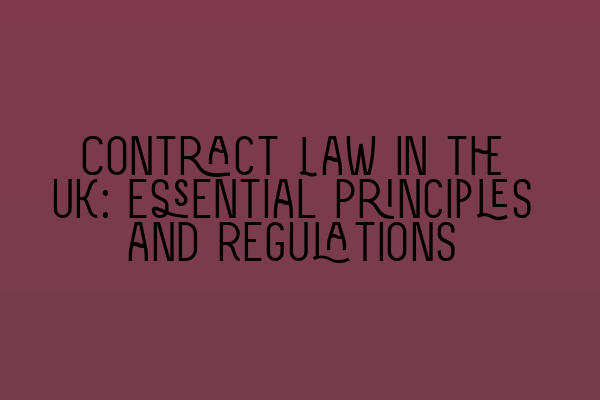Contract Law in the UK: Essential Principles and Regulations
Contract law is a fundamental aspect of the legal system in the United Kingdom. It governs the formation and enforcement of agreements between parties, ensuring that promises are upheld and obligations are met. Whether you are a business owner, individual, or legal professional, understanding the essential principles and regulations of contract law is crucial for navigating the complexities of the legal landscape.
The Basics of Contract Law
At its core, a contract is a legally binding agreement between two or more parties. To be considered legally enforceable, a contract must meet certain requirements:
- Offer: One party must make a clear and unequivocal offer to enter into a contract.
- Acceptance: The other party must accept the terms of the offer without any conditions or modifications.
- Consideration: There must be something of value exchanged between the parties, such as money, goods, or services.
- Intention to create legal relations: The parties must intend for the contract to be legally binding.
- Capacity: The parties must have the legal capacity to enter into a contract. For example, minors and individuals with diminished mental capacity may lack the legal capacity.
Once a contract is formed, the parties are bound by its terms and have legal remedies in the event of a breach. It is important to note that not all agreements are contracts. Some agreements, such as social agreements or agreements without consideration, may not be legally enforceable.
Key Principles of Contract Law
Contract law in the UK is guided by several key principles. These principles help ensure fairness, clarity, and predictability in contractual relationships:
- Principle of Freedom of Contract: Parties are generally free to negotiate and determine the terms of their contracts. However, this freedom is subject to statutory and common law limitations, particularly in relation to consumer contracts and contracts involving unequal bargaining power.
- Principle of Good Faith: Parties are expected to act honestly and in good faith when entering into and performing their contractual obligations.
- Principle of Certainty: Contracts must be certain and clear in their terms. Vague or ambiguous terms may render a contract unenforceable.
- Principle of Privity of Contract: Generally, only parties who are part of a contract have rights and obligations under it. Exceptions to this principle include third-party rights and assignments.
- Principle of Consideration: A contract must include some form of consideration, which is the price paid or benefit received in exchange for the promise.
Common Types of Contracts
Contracts come in various forms, each with its own specific rules and regulations. Here are some common types of contracts in the UK:
- Employment Contracts: These contracts govern the relationship between employers and employees, outlining rights, duties, and terms of employment.
- Commercial Contracts: Commercial contracts cover agreements between businesses, such as supply contracts, service agreements, and partnership agreements.
- Consumer Contracts: These contracts involve transactions between businesses and consumers, such as the sale of goods or services to individuals.
- Property Contracts: Property contracts include agreements related to the buying, selling, or leasing of real estate.
- Intellectual Property Contracts: These contracts focus on the licensing, assignment, or transfer of intellectual property rights, such as trademarks, copyrights, and patents.
Enforcement and Remedies
When a party fails to fulfill their contractual obligations, the aggrieved party may seek remedies through the legal system. Common remedies include:
- Damages: Monetary compensation awarded to the injured party to cover losses suffered due to the breach of contract.
- Specific Performance: A court order requiring the breaching party to fulfill their contractual obligations.
- Injunction: A court order restraining a party from doing something or requiring them to do something.
- Rescission: A cancellation of the contract, returning the parties to their pre-contractual positions.
It is important to note that specific circumstances and the nature of the breach may influence the available remedies.
Conclusion
Contract law forms the backbone of commercial and personal transactions in the UK. Understanding the essential principles and regulations is crucial for individuals and businesses alike to protect their rights and interests. By adhering to the requirements of offer, acceptance, consideration, intention, and capacity, parties can form legally enforceable contracts. Additionally, awareness of the key principles of freedom of contract, good faith, certainty, privity of contract, and consideration ensures clarity and fairness in contractual relationships. Whether you are entering into an employment contract, commercial contract, or consumer contract, a solid understanding of contract law will empower you to navigate the legal landscape with confidence.
For more insights into legal practice and decision-making, check out our article on Unveiling Real-Life Case Studies: Insights into Legal Practice and Decision-Making. If you’re interested in exploring solicitor salaries in the UK and the factors affecting income, our article on Exploring Solicitor Salaries in the UK: Average Earnings and Factors Affecting Income provides valuable information. Additionally, if you want to enhance trust and loyalty in your client relationships, our article on Mastering Client Relationship Management: Skills for Solicitors to Enhance Trust and Loyalty is a must-read. Lastly, if you’re considering a career in law and want to learn more about pursuing a law school education in the UK, our article on Pursuing a Law School Education in the UK: Choosing the Right Path for Your Future will provide valuable guidance. And for aspiring solicitors, check out our article on Securing Training Contracts: A Roadmap to Becoming a Solicitor.
